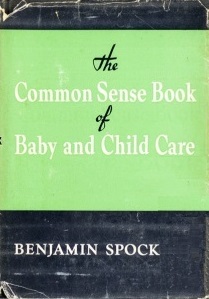Seventy-five years ago this week, The Common Sense Book of Baby and Child Care by Benjamin Spock was first published.
That’s Doctor Spock, so relax, Trekkies among us.
Only a handful of books published throughout history could have other books written about them. This is one of them.
It sold more than 50,000,000 total copies in several dozen languages. From 1946 to the late 90s, most people agreed the only book to sell more copies was the Bible.
Any time something gains such prominence as this book did, a natural outcome is to create many supporters and a significant number of detractors. (Sort of like the Bible.)
Same holds for the author who gave millions of parents a guidebook but was also blamed by many for having a hand in the “undisciplined” and permissive 1960s. Basically, everything wrong in the 1960s and 1970s was his fault, to critics of his methods.
The book has been updated nine times after its original edition, the latest in 2018. One of the darker legacies of the book was the original recommendation to have babies sleep on their stomachs, which later was found to dramatically increase the chances of sudden infant death syndrome (SIDS). This advice was changed in updated editions.
The author also didn’t seem to follow his own advice with his own family, which complicated the legacy of Dr. Spock, who died in 1998 at the age of 95.
But the substantial influence of the book, good or bad, is undeniable.
Book publishing has historical “markers” along its highway which, when you pull over and read about them on the roadside plaques, explain why things happen the way they do. There are few things in publishing today that do not have roots somewhere in the past.
Some of those markers are business processes, like the Internet and Amazon. Others are influential, game-changing people. But mostly the historical markers are books and authors. For certain, Dr. Benjamin Spock and his childcare book is one of those.
An aspiring professional author should study these publishing markers and the books and authors who preceded them in their genre. Consider it intelligence-gathering before you start a business. For certain, if you write in the parenting category, understanding Dr. Spock’s advice that influenced parents (and grandparents) is important.
Did you know Christian publishing as an organized industry is a relatively recent occurrence in the overall history of publishing? There are publishing and literary pioneers in Christian publishing who are still around today. You don’t have to go too far back in collective memory before you bump into people who paved the way.
You can meet them here and there, by pulling over at historical markers.
If you ignore or dismiss the past and those who came before you, you create a world lacking in thankfulness, appreciation, and wisdom.
May this not be said of any of us.



 You’re Not the First Author to …
You’re Not the First Author to …
Interesting, but you’re right. While I have never read the book, the number of times I’ve heard it referenced clearly indicates that it changed the course of a nation. Amazing and good to look back on. What books have stood at the crossroads of the industry I am wanting to be a part of? For Christian Romance I think of Love Comes Softly and Redeeming Love. This Present Darkness and Left Behind influenced both the spiritual warfare market and action/thrillers. These stories sparked change. For Christian children’s books I think of Christy by Catherine Marshal but also the Christy Miller books. For younger children, I think of the Chronicles of Narnia, Imagination Station books, The Sugar Creek Gang, The Action Bible, and God Gave Us You. Now I’m curious and need to investigate this more. I know I’m missing milestones and am curious to discover what they are!
I’m intrigued by your identification of Christy by Catherine Marshall as a children’s book. It’s one of my all-time favorites, but spiritual and psychological struggles and romantic conflicts of a young woman in her first teaching assignment seem to be adult or YA themes to me. I ran a search and found a Christy Juvenile Fiction Series that says it is “Adapted by C. Archer.” It is criticized in the Learning Resource Directory for using Catherine Marshall’s characters and name but completely changing the story, as well as for romance and joking that were “over the top” for the reviewer. I also found a book entitled Christy and ascribed to Marshall, but with a caveat on the cover, “Adapted for Young Adults” and “Adapted by Anna Wilson Fishel” in tiny letters under Catherine Marshall’s name. Were you referencing the series, the adaptation, or Catherine Marshall’s book as a children’s book? The 50th anniversary of Christy’s publication was in 2017, and now it is selling in multiple forms, so I think it is definitely one of those milestone books. Being sure you’re reading what Marshall actually wrote might be a challenge, however! 😉
In 2014 and 2015, I had the great honor of communicating with Elizabeth Sherrill, coauthor of numerous Christian classics, such as The Hiding Place, The Cross and the Switchblade, God’s Smuggler, and other true stories, which are still impacting lives for Christ, through generations. She was cultured but gracious, as she offered guidance and encouragement to share my own story of experiencing God’s help and presence in the midst of adversity. I’ll be forever grateful to Elizabeth, and her husband John, for leading the way for those of us coming behind them.
The Sherrill’s are indeed one of the key people in the history of this industry.
Dan,
Kristin’s comment above made me happy; I’ve read most of those she listed. Are there others you’re willing to mention? Thanks!
Very good read (and right write!)